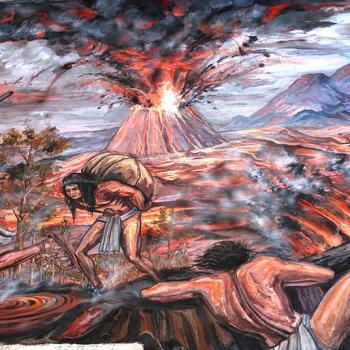
The beat goes on:
Nomadic life breeds hardiness, frugality, eagerness for material things, fortitude, and hospitality. Such qualities are essential to survival. Furthermore, the nomad was and is an individualist, impatient of discipline, reluctant to submit to restraint or authority. (In early Islam, it was always wondered whether the bedouins could ever be real Muslims.) This trait had interesting consequences. With a few exceptions where they came in contact with the Romans or the Persians, or in Yemen to the far south, no authoritarian political forms developed among the pre-Islamic Arabs. In fact, no political institutions arose at all, in the sense that we generally view such things. Bedouin culture has always been much less stratified, less divided into classes, less complex (in a way) than societies based on agriculture. There were transient concentrations of wealth, perhaps, but there was little lasting class stratification among the Arabs before Islam. In a sense, life was very democratic. Indeed, it was virtually anarchic. (Quite the opposite of, say, the neighboring Sasanian Persians and their “king of kings.”) Society was based on individual prowess and prestige, as well as on close lineage and group loyalties. The chief had no authority to coerce. Herdsmen or nomads couldn’t be exploited like peasants, who were tied to their fields and, thus, “rooted” in place. They had pride. Every man was free to depart with his dependents. (Late in the 1970s, I encountered a group of bedouins in the Sinai. That area had recently reverted from Israeli to Egyptian control, and I asked one of them if he were happy to be back under the rule of fellow Arabs. He looked at me as if I were crazy. “We are bedouins,” he said. What did it matter to him who ran the government?)
At this point, some readers will no doubt wonder how the tribes held together at all, if individual Arabs and their families were constantly setting out on their own. How can a society exist without some controls? It’s a good question. In fact, while there was a certain freedom to depart, there were also constraints that would make people want to stay with their tribes and work things out. I’ve said that there were no political institutions throughout most of pre-Islamic Arabia. That’s true, but the practice of the “blood feud” maintained a certain intertribal peace. I realize that blood feuds don’t sound very promising, at first glance, as a peacemaking tool. However, they maintained the peace in the same way that the threat of war maintains a fragile peace in today’s international relations. The process worked more or less as follows: If someone from Tribe A killed someone from Tribe B, Tribe B would feel itself justified in killing someone from Tribe A. If the actual perpetrator of the original murder could be caught and punished, that would be wonderful. But if not, just about anybody from Tribe A would do—provided that he or she were of the same social status. If not, Tribe A would feel itself victimized and would set out to get somebody else from Tribe B. And so on and on, much like the famous Hatfields and McCoys. Sometimes a feud would continue for so long that nobody could quite remember the original offense, only that they had gotten the short end of the stick on the last exchange and that the other tribe was going to have to pay before things were over. This may, as I said above, not seem a very promising way to keep the peace, but it was. Blood feuds were costly. So if Tribe A found that it had a member who was likely to get the tribe into trouble, they would often find a way to deal with him on their own before he acted out his violent intentions or inclinations. And it was in the interest of every individual Arab to maintain his links to a tribe because, without such tribal affiliation, he was vulnerable to anybody who wanted his horse or didn’t like his face. There was no government to protect him. If a tribe did find itself involved in a dispute, it would try long and hard to buy its way out of the situation or, in some other way, to find a peaceful solution.
Virtue, to the ancient Arab, was muruwwa, or “manliness.” (This isn’t far different from the original meaning of our own English word virtue: Vir, in Latin, is the equivalent of English man. Related to this is the term werewolf, for a creature that is supposedly half-wolf and half-human.)[1] This “manliness” expressed itself in a number of ways that we would perhaps not find admirable, although “manly” bravery and honor certainly have something to be said for them. The general spirit of the pre-Islamic Arabian ideal is that of Tennyson’s hero: “To strive, to seek, to find, and not to yield.”[2]
That spirit wasn’t precisely Christian. Revenge, for instance, was considered a virtue, indeed a duty, among the Arabians of the century or so prior to Islam. “When wrong befalls me,” exclaimed a pre-Islamic Arabian Jew by the name of Samawal ibn Adiya, expressing a widely felt idea, “I endure not tamely.”[3] There was, of course, some good reason for this: To fail to avenge an injury was to invite another one, either to yourself or to your kinfolk. There was no government, no police force, to prevent such injuries. It was up to you. Thus, we have preserved the lament of an Arab whose kin refused to help him against a group of raiders who had stolen his camels. In the final line of the lament, we can almost hear the poet’s disgusted astonishment at the weakness of his relatives:
For all their numbers, they are good for naught,
My people, against harm however light:
They pardon wrong by evildoers wrought,
Malice with loving kindness they requite.[4]
[1] I once gave this explanation to a Gospel Doctrine class and then carelessly left the words virtue and werewolf on the blackboard. I was told later that the Relief Society of another ward, meeting in the same classroom afterward, had a vigorous discussion trying to determine what my lesson had been about
[2] This is the last line of Tennyson’s “Ulysses”—written, appropriately enough, about a Homeric hero.
[3] Nicholson, A Literary History of the Arabs, 88.
[4] Nicholson, A Literary History of the Arabs, 92.













